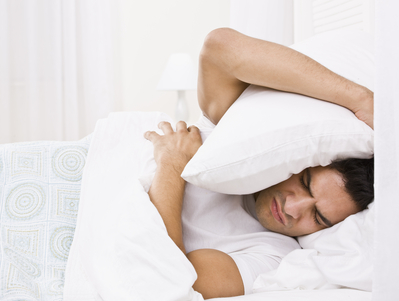
It can be the worst way to spend your next day: tired after suffering a night of repeatedly waking or taking a long time to fall asleep in the first place. Sometimes there are obvious factors which mean we get less sleep than we need, other times we have no idea why we’re not crashing as soon as our heads hit the pillow.
If you have a noisy environment, this can lead to hours of lying awake when you should be dreaming away. If the noise factors are coming from inside the house, you can usually find ways to control them. Appliances that are known to be quiet are great options if the regular hum is obvious during night time hours and just closing your bedroom door might block out household sounds. You can also opt for running a bathroom fan or a portable fan right in your room, or have other sources of white noise. If music makes you sleepy, turn on the radio to a channel that allows for slow, soothing sounds, or try a recording of relaxing sounds of nature, whether it’s ocean waves or wind blowing through the trees.
Sometimes having a late night snack can be what’s keeping us awake. Our bodies take the time at night while we’re sleeping to relax, regroup, and heal. When we stimulate our digestive tract, our bodies sometimes get confused, thinking that it’s still time to be up and about. Or you might suffer heart burn or upset stomach. If you’re hungry in the evening, this can be due to a variety of factors; maybe you’re not eating enough at dinnertime, or maybe you’ve developed a habit that your body is used to and needs to be trained out of. You might also be bored! Too often when we’re not occupied we mistake our feeling for needing to eat, and usually we’re not hungry for healthy food anyway during this type of situation. Make sure you’re getting enough food at dinnertime, and while you’re weaning yourself from evening meals, try to satiate your rumblings with a sleep inducing tea or plain water.
Light can make the difference between falling asleep and lying awake, so try to eliminate sources if you can. Shutting off all lights in your room, having blinds or light blocking curtains over windows that you can close, and even turning off lights around other parts of the house can sometimes signal our bodies that it’s time to relax. During the summer this can be harder since the daylight hours are so long, but if you haven’t invested in window dressings, hanging a towel temporarily will block light in the same way. If you’re especially sensitive, turning your digital clocks to face the wall should help, and make sure your technological devices are on sleep mode, or, better yet, out of the room entirely.
Being active during the day can help you to be tired enough at night that sleep comes more naturally. If you’re lying awake, it might be that you simply have too much pent up energy. Some people swear by evening workouts, but this often leads to higher energy levels and can frustrate those trying to improve sleeping habits. Try a morning workout routine and keep it regular. Once your body gets used to the daily activity, you might find you fall asleep far more quickly and stay asleep for longer periods of time.
Your mattress is something you should definitely take a look at if you’re finding trouble getting enough slumber. If it’s old or has pockets of wear, it might be time to change it up. If you’re sore in the morning, this is a good indication that your mattress has given up the ghost. Sometimes our sleep is interrupted by the movements of our partners, and if this is the case a mattress that isolates movements for each sleeping body is a great idea. Memory foam can be a wonderful option, but the best help will likely come from research and the advice from your local mattress dealer.
Avoiding stimulants is key when you’re winding down for the evening. This can include technology (the recommendation is to avoid screens at least a couple of hours before bed and opt for conversation, a good book or listening to soft music instead) Stimulants also includes drinking alcohol or the use of certain medications. If you find that you’re not able to fall and stay asleep, check the potential side effects of your medications and try taking them earlier in the day if possible. You could also ask your doctor about other options if you do have to take them in the evening. Drinking in the evening can also be the culprit for late nights of wakefulness. A single glass of wine or other drink can certainly ease you into sleep, but more than that and you risk it having the opposite effect instead.
Before bed having a good routine will indicate to your subconscious that it’s time to wind down. As your preparations begin, and you focus on a bedtime routine, your body has a chance to relax. A hot bath, a book or even the act of turning off lights and locking doors can serve as an indicator that bedtime has arrived.
This article was written by Nina Wells from Steam Shower Store. She has over 10 years’ experience in writing health related topics and specializes in the health benefits of saunas and hydrotherapy.

Leave a Reply